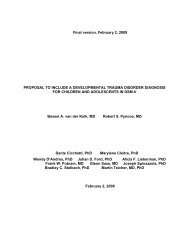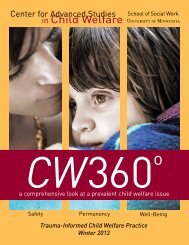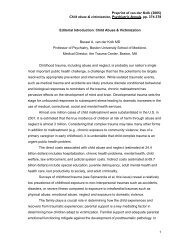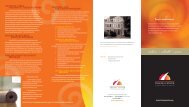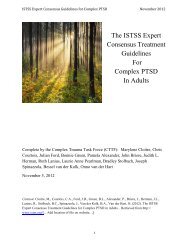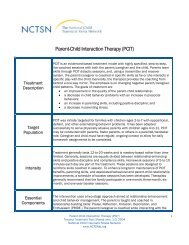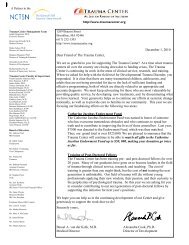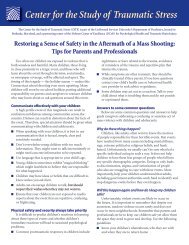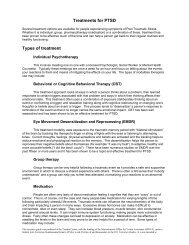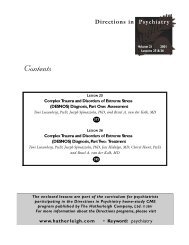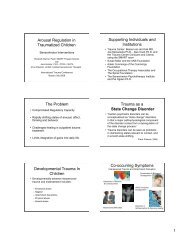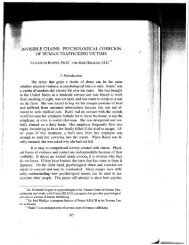PRE-CONFERENCE INSTITUTESJune 20 - 21, 2007RegistrationProgramLunch (on your own)8:00 - 8:30 AM8:30 - 5:15 PM12:30 - 2:00 PMPre-conference workshop I meets all day, Wednesday, June 20, and Thursday, June 21.Pre-conference workshops II, III, IV, V, VI, VII, and VIII meet all day Thursday, June 21.Please choose Workshop I, II, III, IV, V, VI, VII or VIII on the registration form.WORKSHOP I: Attachment, Self-Regulation andCompetency (ARC): A Framework for Interventionwith Complexly <strong>Trauma</strong>tized YouthMargaret Blaustein, PhD • Kristine M. Kinniburgh, LICSW(This workshop meets two days – Wed., June 20, and Thurs., June 21)A substantial percentage of children exposed to trauma has experienced multipleor prolonged exposures. This demands a flexible model of practice, embeddedin a framework that can be adapted to the social environment in which thechild is being treated. This workshop constitutes the official two-day formaltraining in ARC. It introduces a framework for intervention to address themultiple individual, familial, and systemic needs of this population, built around10 key principles of intervention. Discussion points for each principle includekey concepts, educational information for providers and caregivers, specific toolsfor clinicians, and developmental considerations. This workshop will combinedidactic training, experiential activities, hands-on participation, and case application.Enrollment will be limited to 60 participants.WORKSHOP II: <strong>The</strong> Neuroscience of Self-Awarenessand Self-RegulationRuth Lanius, MD • Jim Hopper, PhD • Sarah Lazar, PhD •Eric Vermetten, MD, PhD • Mohammed R. Milad, MD •Bessel A. van der Kolk, MDThis pre-conference workshop will address neuroscientific and clinical perspectiveson mindfulness and self-regulation, based on presentations and videodemonstrations. We will experientially demonstrate how people can play a rolein their own physiological self-regulation with focused attention, movementand breathing. We will examine the psychological processes and brain circuitsimplicated in emotion dysregulation, emotional awareness and mindfulness,including the role of the medial prefrontal cortex in conditioned fear extinction,the neural underpinnings of positive and negative emotional experiences, andthe effects of pharmacological interventions on brain activation. We will presentevidence that mindfulness meditation can alter the structure and function ofkey brain regions involved in emotional awareness and emotional regulation.WORKSHOP III: Surviving the Aftermath: A SensorimotorApproach to the Wounds of War, Abuse and AttachmentPat Ogden, PhD • Michael Broas, LMTThrough lecture, discussion, brief experiential exercises, and videotaped excerptsof therapy sessions, this workshop will explore the effects of abuse, combat,and torture. Participants will learn the body’s response to trauma, attachmentrelationships and developmental issues, as well as how these experiencesinfluence each other. <strong>The</strong> morning presentation will focus on SensorimotorPsychotherapy approaches to childhood trauma; Dr. Ogden will be joined forthe afternoon by Michael Broas, a Vietnam veteran whom she treated.Videotaped excerpts of Mr. Broas’ treatment will illustrate interventions thathelp combat trauma survivors to integrate their experiences. <strong>The</strong> very act ofremembering commonly exacerbates symptoms; therefore, somatic interventionsthat facilitate a gradual exposure to the procedural components of thememory, with a primary focus on somatic processing, will be explored.WORKSHOP IV: Treatment of <strong>Trauma</strong> and Eating Disorders,Sexual Compulsivity, and Self-Injury: Integration ofTreatment Models in Videotaped SegmentsMark Schwartz, ScD • Lori Galpern, MSW, LCSWDissociation is more related to early attachment problems than acute or chronictrauma. An eating disorder is very much an ego-state that “hijacks” the bodywith concomitant poor self-differentiation. Many eating disorder patients comefrom families with no overt trauma. Utilizing a dissociative and attachmentbasedmodel, this workshop will review the presenter’s experience with eatingdisorder clients at an intensive inpatient setting. To provide a “hands-on” slant,videotaped segments of therapy sessions will be integrated with theoretical andconceptual aspects of treatment. Special emphasis will be placed on techniquesto facilitate self-differentiation. Assessing outcome also will be discussed.WORKSHOP V: Facilitating Intimacy with One’s Self:An Introduction to Internal Family Systems <strong>The</strong>rapyRichard Schwartz, PhDOne central aspect of the Internal Family Systems model is the elaboration ofthe concept of “self.” This model necessitates the therapist’s exploration of hisor her own internal experience. Helping clients trust self-leadership catalyzesself-healing. <strong>The</strong> therapist needs to develop parallel self-awareness in order toassist clients in their self-reorganization. Successful psychotherapy of childhoodtrauma and neglect results not only in effective coping with the past, but alsoin a transformation in the capacity for intimacy.WORKSHOP VI: Tai Chi Chuan and Qi Gong forSelf-Regulation and Grounding in Complex <strong>Trauma</strong>Michael A. Grodin, MD • Derek Fulker, MA • Dan Kleiman •Robert Saper, MD, MPH • Lin Piwowarczyk, MD, MPH •Bill Robertson • Alan DougallThis is an experiential workshop that will address and demonstrate the use ofthe Internal Energy Arts (Tai Chi Chuan, Chi Gung) as a way for trauma survivorsto reconnect to their body, mind and spirit. <strong>The</strong> leader’s experience in caring forsurvivors of torture and refugee trauma will demonstrate how these exercisesserve as self-regulatory and grounding techniques for the treatment of complexPTSD. Workshop participants will learn the simple process of “Turning the WheelChi Gung.” Tai Chi master teachers will provide individualized instruction.WORKSHOP VII: Re-establishing Physical andRhythmic Attunement to Internal ExperiencesAfter <strong>Trauma</strong>tic ExposureSteven Gross, MSW • Robert Macy, PhD • Ron Jones •Dicki Johnson Macy, M.Ed, LMHC, ADTR • Anthony Toombs •Joseph Spinazzola, PhD • Bessel A. van der Kolk, MD<strong>Trauma</strong>tic and uncontrollable events overwhelm survivors with a sense ofimpotence and immobilization. <strong>The</strong> visceral experience of helplessness andfear causes a core re-organization of the self. Transformation of self-perceptionthrough physical actions and attuned rhythms can help change victims intoembodied survivors. This pre-conference workshop will explore the origins andstep-wise evolution of the “interoceptive voice,” which acts as a natural antidoteto experiences of fear, helplessness and impotent rage. Participants will learn,through a series of experiential activities, how to work with voice, rhythms,movement, and postures. <strong>The</strong>se activities will be applied to working withtraumatized children ages 18 months to 3 years, 3 years to 6 years, 6 years to10 years, pre-teens and teens.WORKSHOP VIII: Pesso Boyden Psychotherapy:Healing the Wounds of Past Deficits, <strong>Trauma</strong>sand Ruptures in Family NetworksAlbert Pesso, BASection I: Fundamentals of body-based techniques are used in creation of newmemories that ameliorate the effects of traumatic histories and maturationaldeficits. Interventions provide limits for overwhelming emotional impulses inorder to reverse the traumatic consequences of loss of self-control and to helpreturn a sense of meaning to life.Section II: “Holes in Roles” presents a perspective on the compassionateresponses of children who have heard stories of traumatic histories of presentand long-dead family members and its paradoxical consequences. Livedemonstrations applying PBSP “structures” will illustrate how to create new,need-satisfying, symbolic memories to help clients handle the normal vicissitudesof life.
PSYCHOLOGICAL TRAUMA:Neuroscience, Attachment and <strong>The</strong>rapeutic Interventions June 22 - 23, 2007COURSE DESCRIPTION<strong>The</strong> study of psychological trauma has been accompanied by anexplosion of knowledge about how experience shapes the centralnervous system and the formation of the self. Developments in theneurosciences, developmental psychopathology and informationprocessing have contributed to our understanding of how brainfunction is shaped by experience and the belief that life itselfcan continually transform perception and biology. Within thedisciplines of psychiatry and psychology, the study of trauma hasprobably been the single most fertile area in helping to develop adeeper understanding of the relationship among the emotional,cognitive, social and biological forces that shape human development.Starting with post-traumatic stress disorder (PTSD) inadults and expanding into early attachment and overwhelmingexperiences in childhood, this endeavor has elucidated howcertain experiences can “set” psychological expectations andbiological selectivity.We have learned that most experience is automatically processedon a subcortical level, i.e., by “unconscious” interpretations thattake place outside of awareness. Insight and understanding haveonly a limited influence on the operation of these subcorticalprocesses. When addressing the problems of traumatized peoplewho, in a myriad of ways, continue to react to current experienceas a replay of the past, there is a need for therapeutic methodsthat do not depend exclusively on understanding and cognition.OBJECTIVE<strong>The</strong> objective of this course is to present current research findingsabout how people’s brains, minds and bodies respond to traumaticexperiences, how they regulate emotional and behavioralresponses, and the role of relationships in protecting and restoringsafety and regulation.We will explore post-traumatic responses at different developmentallevels, as well as the treatment implications of these findings.We also will explore how affect regulation and the interpretationof innocuous stimuli as threats require interventions aimed atrestoring active mastery and the capacity to focus on the present.Since traumatic memories often are dissociated and may beinaccessible to verbal recall or processing, close attention must bepaid to the development of inner resources to deal with dysregulationand helplessness, and the careful timing of the explorationand processing of the traumatic past.Last, the course will examine cutting-edge treatment interventionsfor various trauma-based symptoms.A Perfect Waterfront Location<strong>The</strong> Seaport World Trade Center is located on Boston Harbor—abeautiful place for a conference/short vacation in the spring andearly summer. With an abundance of sun and temperatures in thelow 70s, the harbor isone of Boston’s best-keptsecrets this time of year.Located within easywalking distance of theSilver Line subway, thehotel is convenient to allof Boston’s sites and visitorattractions.CONFERENCE LOCATIONSeaport World Trade CenterCONFERENCE HOTEL<strong>The</strong> Seaport Hotel (adjacent to the World Trade Center)One Seaport LaneBoston, MA 02210877-732-7678RESERVATIONSConference attendee rate is $199 per night. Reservations can bemade directly with the hotel; call toll-free 1-877-SEAPORT.Please mention that you are attending the <strong>Trauma</strong> Conference.www.seaportboston.comPARKINGAvailable at the Seaport Garage; event day rate parking is $17.TRANSPORTATIONAir travelers can reach the Seaport by taxi in less than 10 minutesfrom Logan International Airport.MASS TRANSITTraveling on the T: Take the Silver Line to the World Trade Centerstop. You also can take the Silver Line from the airport to theWTC stop. Detailed information can be found at www.mbta.com.



